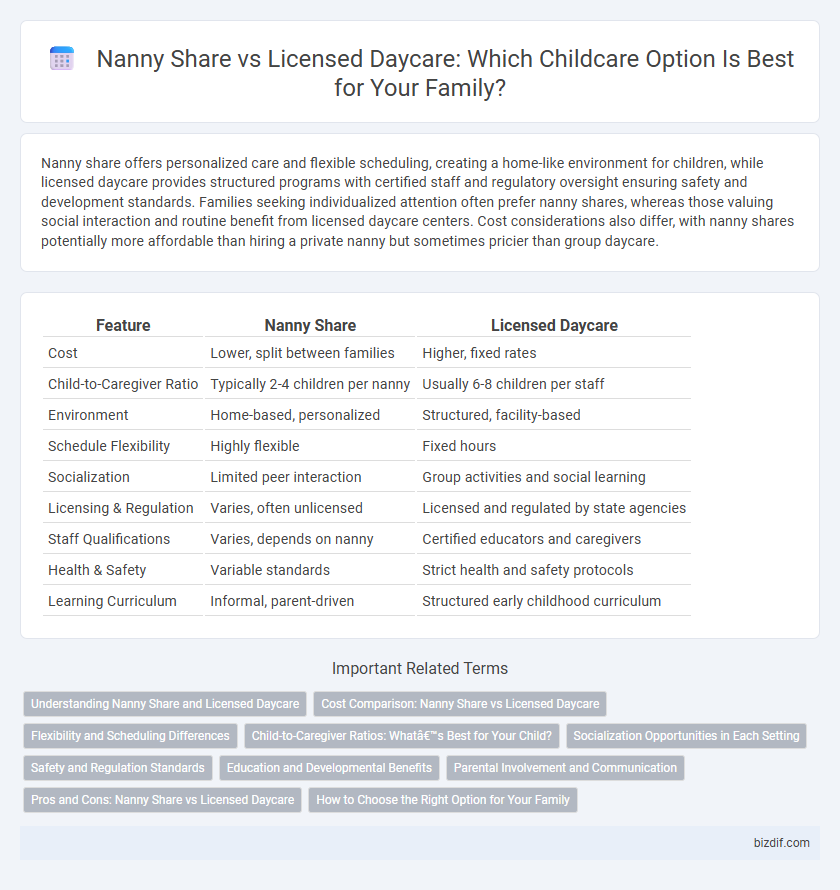Nanny share offers personalized care and flexible scheduling, creating a home-like environment for children, while licensed daycare provides structured programs with certified staff and regulatory oversight ensuring safety and development standards. Families seeking individualized attention often prefer nanny shares, whereas those valuing social interaction and routine benefit from licensed daycare centers. Cost considerations also differ, with nanny shares potentially more affordable than hiring a private nanny but sometimes pricier than group daycare.
Table of Comparison
| Feature | Nanny Share | Licensed Daycare |
|---|---|---|
| Cost | Lower, split between families | Higher, fixed rates |
| Child-to-Caregiver Ratio | Typically 2-4 children per nanny | Usually 6-8 children per staff |
| Environment | Home-based, personalized | Structured, facility-based |
| Schedule Flexibility | Highly flexible | Fixed hours |
| Socialization | Limited peer interaction | Group activities and social learning |
| Licensing & Regulation | Varies, often unlicensed | Licensed and regulated by state agencies |
| Staff Qualifications | Varies, depends on nanny | Certified educators and caregivers |
| Health & Safety | Variable standards | Strict health and safety protocols |
| Learning Curriculum | Informal, parent-driven | Structured early childhood curriculum |
Understanding Nanny Share and Licensed Daycare
Nanny share involves two or more families sharing the services of a single nanny to provide personalized, in-home childcare, often offering flexible scheduling and a more intimate setting for children. Licensed daycare centers operate under state regulations, providing structured environments with certified caregivers, age-appropriate curriculum, and mandated safety standards. Understanding the differences helps parents assess care quality, socialization opportunities, and cost-effectiveness when deciding between a nanny share and licensed daycare.
Cost Comparison: Nanny Share vs Licensed Daycare
Nanny shares typically offer a more cost-effective childcare solution by splitting the nanny's salary between families, reducing per-child expenses compared to licensed daycare centers with fixed rates. Licensed daycares often have higher fees due to comprehensive services, facility maintenance, and adherence to regulatory standards. Families seeking budget-friendly options may find nanny shares provide personalized care with significant savings over traditional licensed daycare costs.
Flexibility and Scheduling Differences
Nanny shares offer greater scheduling flexibility, allowing parents to coordinate hours that fit their unique routines, often accommodating irregular work shifts or last-minute changes. Licensed daycares typically operate on fixed hours with structured schedules and set drop-off and pick-up times, providing reliability but less adaptability. Families seeking customizable care arrangements may prefer nanny shares, while those valuing consistent daily routines often choose licensed daycare centers.
Child-to-Caregiver Ratios: What’s Best for Your Child?
Nanny share arrangements typically offer lower child-to-caregiver ratios, often one caregiver for two to three children, allowing for personalized attention and tailored care. Licensed daycares are required to adhere to state-mandated ratios, usually ranging from one caregiver per four infants up to one per ten preschoolers, ensuring regulated oversight and socialization opportunities. Choosing between a nanny share and licensed daycare depends on your child's need for individualized care versus structured group interactions in a professionally regulated environment.
Socialization Opportunities in Each Setting
Nanny shares offer personalized socialization opportunities, allowing children to engage closely with a small group of peers in a home-like environment. Licensed daycares provide structured social interactions with larger, diverse groups, promoting the development of broader social skills and adaptability. Both settings support social growth but differ in group size and social exposure intensity.
Safety and Regulation Standards
Licensed daycare centers adhere to strict safety and regulation standards set by state authorities, ensuring comprehensive child supervision, sanitation protocols, and staff qualifications. Nanny shares, while offering personalized care and flexible scheduling, often lack consistent regulatory oversight, which can result in varied safety practices depending on the caregiver's experience and compliance. Families prioritizing formal safety assurances typically choose licensed daycare for structured environments meeting governmental safety benchmarks.
Education and Developmental Benefits
Nanny shares provide personalized, one-on-one attention that supports tailored educational activities and individualized developmental milestones for each child. Licensed daycares offer structured curricula designed by early childhood education experts, promoting socialization and cognitive skills through group interactions and age-appropriate learning environments. Both options emphasize early learning, but licensed daycares typically follow state-mandated standards ensuring consistent educational progression and developmental assessments.
Parental Involvement and Communication
Nanny shares offer personalized parental involvement with direct daily communication between parents and caregivers, fostering a strong partnership in the child's development. Licensed daycare centers provide structured communication through scheduled updates, progress reports, and standardized child care policies ensuring consistent transparency. Parents seeking active engagement often prefer nanny shares, while those valuing formal communication channels tend to choose licensed daycare environments.
Pros and Cons: Nanny Share vs Licensed Daycare
Nanny share offers personalized care in a home environment with flexible scheduling, often at a lower cost compared to licensed daycare centers. Licensed daycare provides structured educational programs, regulated safety standards, and socialization opportunities with diverse peer groups, ensuring compliance with state regulations. However, licensed daycare may have less individualized attention and rigid hours, while nanny shares can lack formal oversight and consistent quality controls.
How to Choose the Right Option for Your Family
Assess your family's schedule, budget, and child's social needs when choosing between a nanny share and licensed daycare. Nanny shares provide personalized care with fewer children, ideal for flexible routines and close supervision. Licensed daycares offer structured environments, regulated safety standards, and peer interaction, suited for families seeking consistency and social development opportunities.
Nanny Share vs Licensed Daycare Infographic

 bizdif.com
bizdif.com